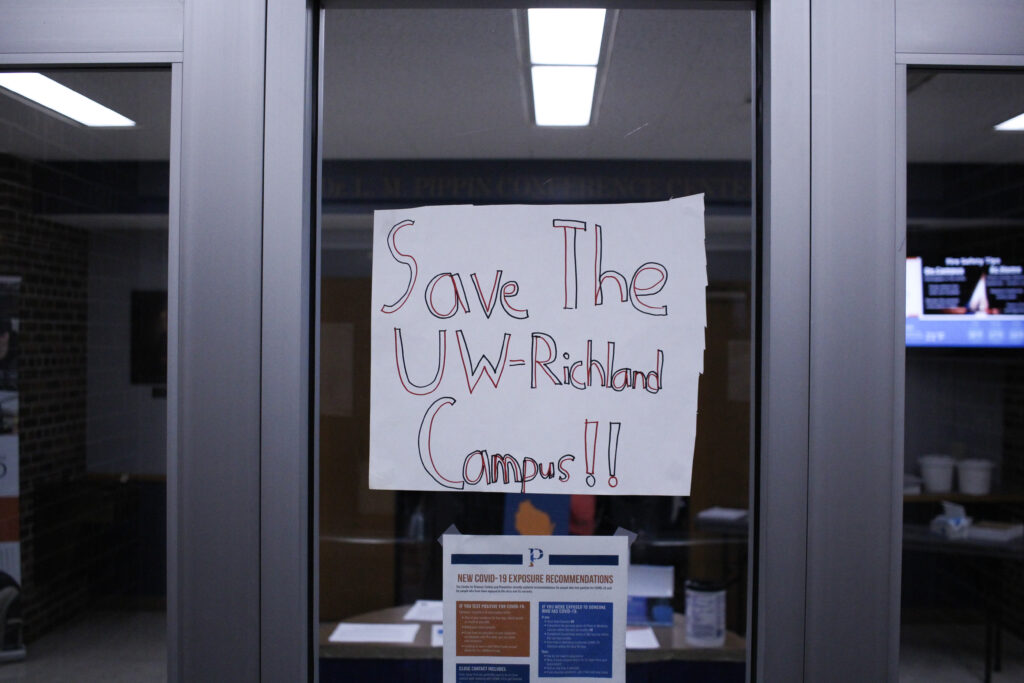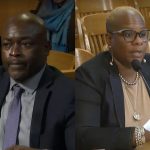Students, Professors Question Closure of UW Two-Year Campuses
Why the austerity measures when state has a $4 billion surplus?

Community members rallied in 2023 to try to save the UW-Richland campus from being closed. On Monday faculty union leaders and students took part in an event criticizing the Universities of Wisconsin and policymakers for cuts to the UW’s two-year campuses when the state remains flush with cash. (Henry Redman | Wisconsin Examiner)
On Monday, a group of state legislators, professors and students questioned the “austerity” measures that have led to the closure of several of the Universities of Wisconsin’s two-year campuses and layoffs at others while the state sits on a multibillion-dollar budget surplus.
Speakers at the hybrid event, hosted online and at UW-River Falls by the campus chapter of the American Federation of Teachers — the union that represents UW professors across the state — said decades of mismanagement, bad decisions and political interference have led to the decline of the state’s two-year campuses and will only hurt Wisconsin moving forward.
Jon Shelton, a professor at UW-Green Bay and AFT-Wisconsin vice president, pointed to the recent closure of the UW-Milwaukee Waukesha campus and the end of library services at UW-Green Bay’s Marinette campus as evidence of decisions from state leadership, including system President Jay Rothman that are harming students.
Wisconsin has 13 four-year campuses and 12 two-year campuses. Over the past decade, the two-year campuses have seen enrollment decline after being consolidated with the four-year schools. Last year, UW-Platteville at Richland County was shut down and earlier this month, the closure of UW-Milwaukee at Waukesha County was announced.
“So what’s happening here is at a time when our state has a $4 billion surplus, we’re seeing students have fewer and fewer academic options,” Shelton said. “And it’s all because of the war on public higher ed and our state, a war … against the idea that students from working families deserve to have all the options that elite families have.”
The event Monday was held by Neil Kraus, a River Falls political science professor and the president of the campus union. Kraus said if someone came from outer space and listened to university administration talk about the state of the system, they would think the economy is terrible. Instead, Kraus said, campuses are closing while the state enjoys record low unemployment, the stock market is rising and the state sits on a $4 billion surplus.
He said that “austerity is always a political choice,” and right now that choice is being made by “powerful interests and powerful individuals” who “don’t want to pay taxes to fund public education.”
If this is how the state’s public universities are being run now, Kraus asked, what will happen when the cycle goes the other way.
“Unemployment is 3.5%, 4%, there’s a state surplus, the stock market is at an all-time high, corporate profits are at an all-time high and we’re having this debate now,” Kraus said. “This is the economic context that we find ourselves in.”
Noting that the economy is cyclical, he raised the question of what would happen when there’s a downturn. “We’re shutting down our schools when the economy is booming and we have a surplus,” Kraus said. “What do people reasonably think is going to happen? It’s going to be far worse.”
A trio of students spoke at the event to highlight how their experience at school has been worsened by cuts to UW campuses. One student said overworking professors makes it hard for them to find time to mentor their students, while another complained that it’s hard to learn German when the professor is on a different campus across the state. The third said that cuts to smaller programs and departments will cause campus communities to “wither” until there’s nothing left.
Democratic state Rep. Katrina Shankland, whose district includes UW-Stevens Point, said that in the 1970s and 80s, the smaller four-year campuses across the state received up to half of their funding from the state budget. But decades of cuts to that support have left those schools more reliant on tuition dollars, causing tuition to increase, ultimately hurting Wisconsin families.
“We all have a shared responsibility to champion investment in public higher education,” said Shankland, who sits on the Assembly Colleges and Universities committee and is currently running for Congress. “For every $1 we put into our campuses, we get $23 back.”
She compared that return to investment in tourism, which nets $7 for every dollar in investment, and the arts, which net $10.
“We should be singing that from the rooftops because by design austerity, it is a policy preference. It is a policy choice,” she continued. “It is policymakers who are choosing not to champion public higher education. And I refuse to fall into that trap of we can have one thing but not the other — we can either have a surplus or public higher education. We can have both.”
Legislators, students, union leaders question closure of UW two-year campuses with state surplus was originally published by Wisconsin Examiner.






















I don’t know the answers here, but this is too bad. Attending one of these schools saved me an immense amount of student loans and also got me smaller class sizes compared to many freshman and sophomore lectures at larger campuses. Not to mention the athletics were outstanding. All in all, just a bummer.
UW-Waukesha served as a venue for many community activities throughout the year for non-students, as well. The added value component that these institutions provided will be lost.
The answer? Vos. It always comes back this worthless a##hat. The Democratic governor is most certainly pro-education, and that automatically means that most every Republican in the state is against almost everything he would like to advance, and that includes education. $4 billion in state surplus, and MPS is BEGGING for another $252 million from taxpayers in a city that is so horribly over-taxed already, in no small part due to the unfair appropriation of revenue distribution to the city. The same arrogant, vindictive and hateful GOP attitude is being applied to higher education in the state.
I work at UW-Milwaukee. The situation is bad. Budget cut after budget cut after budget cut. Do more with less. Started with Reagan (education hater) and got worse with Walker (education hater and son of a baptist). There ARE cuts that could be made to the UW-System. The “fat” is NOT in the classrooms.
By all means, let’s eliminate the least expensive, most accessible means of receiving a quality degree in Wisconsin.
Bull***t!
As long as voters in these areas continue to elect Republican representative who go along with the party line of defunding State colleges and universities, losing valuable assets like the two year programs will continue.